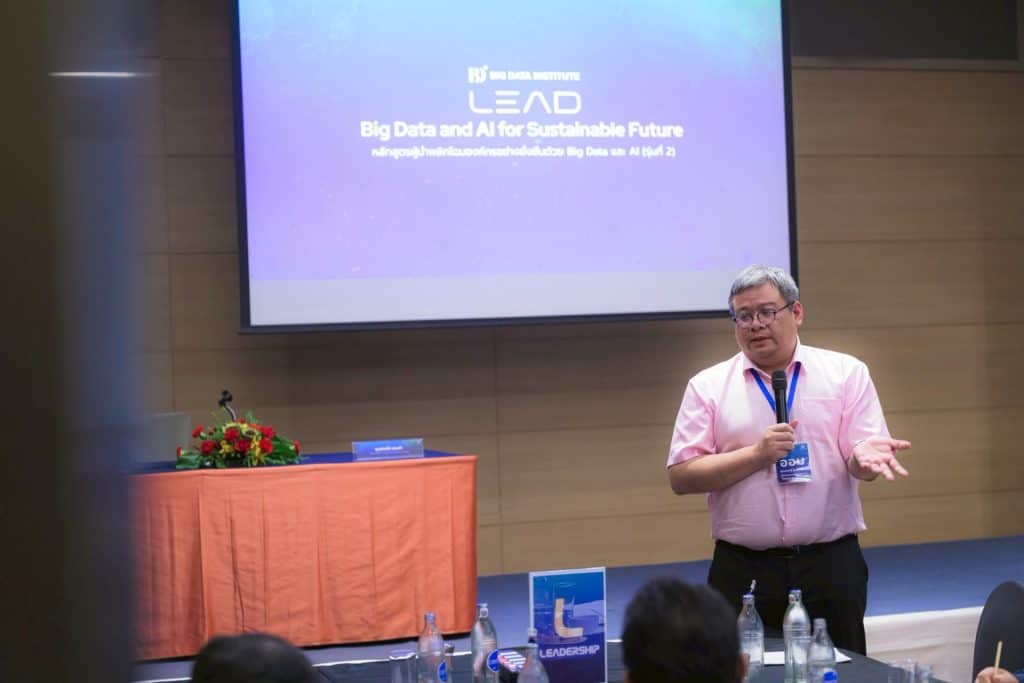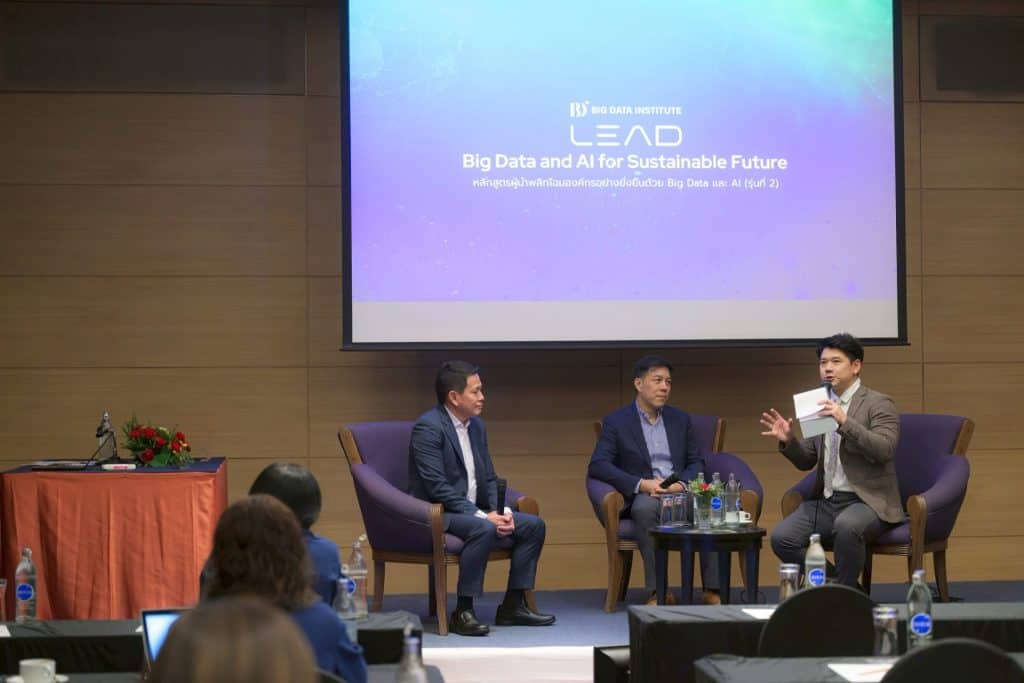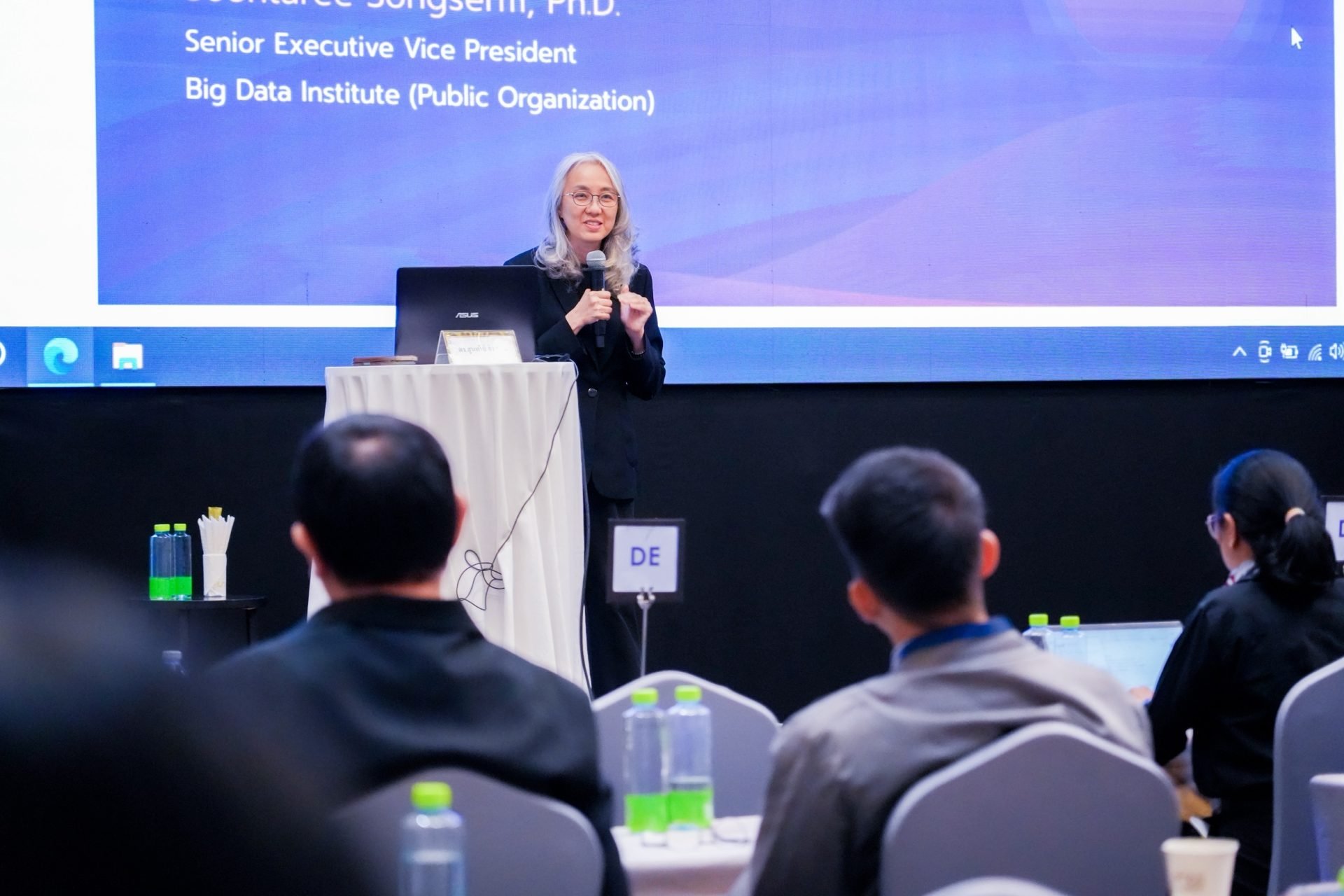26 มิถุนายน 2568, กรุงเทพฯ – สถาบันข้อมูลขนาดใหญ่ (องค์การมหาชน) หรือ BDI จัดอบรมหลักสูตร LEAD: Big Data and AI for Sustainable Future รุ่นที่ 2 เดินหน้าพัฒนาศักยภาพผู้นำภาครัฐ เอกชน และธุรกิจเกิดใหม่ ผ่านองค์ความรู้ด้านข้อมูลขนาดใหญ่ (Big Data) และปัญญาประดิษฐ์ (AI) อย่างต่อเนื่องเข้าสู่สัปดาห์ที่ 4 ณ โรงแรมสวิสโซเทล กรุงเทพฯ รัชดา โดยช่วงเช้าเริ่มต้นด้วยกิจกรรม Session พิเศษ “AI Prompt & Play” ที่เปิดโอกาสให้ผู้เข้าอบรมได้สัมผัสการใช้งานเครื่องมือ AI อย่างสร้างสรรค์ ช่วยให้สร้างงานนำเสนอที่มีทั้งเนื้อหาและรูปภาพประกอบ ภายในเวลาอันรวดเร็ว ยกระดับคุณภาพผลงานและช่วยให้การทำงานของคุณง่ายขึ้น แม้ว่าคุณจะไม่ถนัดงานสายกราฟิกก็ตามด้วยแพลตฟอร์ม Gamma.app

ต่อด้วยการอบรมอย่างเป็นทางการภายใต้หัวข้อ “Leading with Data: Use Cases for Executives” โดยได้รับเกียรติจากนายวิบูลย์ ภัทรพิบูล ผู้ช่วยเลขาธิการ สายเทคโนโลยีดิจิทัล สำนักงานคณะกรรมการกำกับหลักทรัพย์และตลาดหลักทรัพย์ (ก.ล.ต.) และดร.วันประชา เชาวลิตวงศ์ ผู้อำนวยการอาวุโส ฝ่ายบริหารข้อมูลและดาต้าอนาไลติกส์ ธนาคารแห่งประเทศไทย สะท้อนให้เห็นว่า “ข้อมูล” กลายเป็นเครื่องมือเชิงกลยุทธ์ของภาครัฐ ซึ่งนำเสนอการเปลี่ยนผ่านสู่ระบบ Granular Data เพื่อเพิ่มความแม่นยำในการวิเคราะห์ความเสี่ยงทางเศรษฐกิจ พร้อมเปิดเผยกรณีการใช้ AI วิเคราะห์ข้อความจากโฆษณาสินเชื่อผิดกฎหมายและข้อมูลทางเลือก (Alternative Data) เช่น ราคาสินค้าออนไลน์ เพื่อวัดเงินเฟ้อแบบเรียลไทม์ และการใช้ AI อย่างมีความรับผิดชอบ ซึ่งไม่เพียงสะท้อนวิสัยทัศน์เชิงนโยบาย แต่ยังเปิดมุมมองใหม่ให้องค์กรเห็นภาพการใช้ Big Data และ AI ที่ “ทำได้จริง” ในบริบทของการกำกับดูแลและการบริหารความเสี่ยงระดับประเทศ


และช่วงบ่ายเป็นหัวข้อ “Big Data in Action: Applications for Business Growth” โดย ดร.ศิษฎพงศ์ เศรษฐภัทร ที่ปรึกษาอิสระด้าน Big Data และ AI ซึ่งได้ถ่ายทอดแนวคิดว่า Big Data ในปัจจุบันไม่ใช่แค่เรื่องของปริมาณ ความเร็ว หรือความหลากหลายของข้อมูลอีกต่อไป แต่ต้องตอบโจทย์ “Value” ที่จับต้องได้ โดยยกตัวอย่างแผนพัฒนาองค์กรด้วยข้อมูล 4 ระยะ ตั้งแต่การวางรากฐานข้อมูลที่มั่นคง การเปิดใช้งาน AI อย่างมีประสิทธิภาพ การลงมือใช้จริงในระดับธุรกิจ พร้อมชี้ให้เห็นความสำคัญของการเริ่มต้นจาก “Plus AI” คือการเรียนรู้การใช้โมเดล AI สาธารณะ หรือการสร้าง AI แบบเฉพาะขององค์กร อีกทั้งยังเน้นว่าองค์กรที่ประสบความสำเร็จต้องมีความเข้าใจทั้งมุม Data-Centric และ Model-Centric พร้อมยกกรณีศึกษาหลากหลายจากภาคการเงิน ค้าปลีก อุตสาหกรรม และสุขภาพ เพื่อสะท้อนให้เห็นว่า Big Data และ AI ไม่ใช่แค่เทคโนโลยี แต่คือเครื่องมือทรงพลังในการเปลี่ยนผ่านธุรกิจให้เติบโตและยืดหยุ่นในโลกที่เปลี่ยนแปลงรวดเร็ว


ปิดท้ายของวันอบรมด้วยหัวข้อ “Driving Change Through Digital Transformation” โดยนางสาวปาจรีย์ แสงคำ Head of Digital Technology บริษัท โอสถสภา จำกัด (มหาชน) นำเสนอกรณีศึกษาการพลิกโฉมองค์กรโอสถสภาอย่างเป็นรูปธรรม โดยเน้นย้ำว่าความเปลี่ยนแปลงทางดิจิทัลไม่ใช่เพียงการนำเทคโนโลยีเข้ามาใช้ แต่ต้องเชื่อมโยงกับเป้าหมายทางธุรกิจอย่างชัดเจน ไม่ว่าจะเป็นการพัฒนา “Order to Cash Innovation” ให้ครบวงจรตั้งแต่การสั่งซื้อจนถึงการจัดส่งด้วยระบบอัตโนมัติและ AI การใช้ Net Sales Intelligence วิเคราะห์ยอดขายแบบเรียลไทม์ รวมถึงการพัฒนาพนักงานให้เป็น “Digital Citizen” ที่สามารถสร้างแอปฯ ด้วยตนเองผ่านเครื่องมือ Low-Code/No-Code กว่า 500 แอปพลิเคชัน ผลลัพธ์จากการเปลี่ยนแปลงเหล่านี้สะท้อนในตัวเลขรายได้ที่เติบโต พร้อมต้นทุนการบริหารที่ลดลงอย่างมีนัยสำคัญ

นอกจากนี้ ผู้เข้าอบรมยังได้ร่วม Workshop “Deep Dive into Data with Service Blueprint” ออกแบบกระบวนการบริการในองค์กรของตน โดยเริ่มจากระบุ Use Case ที่สำคัญ เช่น กระบวนการจัดซื้อหรือการตลาด วิเคราะห์สถานะปัจจุบัน เทียบกับเป้าหมายในอนาคต พร้อมอธิบายเหตุผลว่าทำไมจึงควรทรานส์ฟอร์ม จากนั้นสำรวจโอกาสในการนำ AI เข้ามาใช้งาน เช่น การวิเคราะห์ข้อมูลหรือเพิ่มความอัตโนมัติในขั้นตอนต่าง ๆ ก่อนจะวาง Action Plan ภายใน 7 วัน และประเมินอุปสรรค พร้อมแนวทางแก้ไข โดยทุกกลุ่มได้เชื่อมโยงผลลัพธ์กับเป้าหมายทางธุรกิจอย่างชัดเจน

Public Relations and Communication Specialist
Big Data Institute (Public Organization), BDI
- Narisara Boonsrihttps://bdi.or.th/en/author/narisara-bo/
- Narisara Boonsrihttps://bdi.or.th/en/author/narisara-bo/
- Narisara Boonsrihttps://bdi.or.th/en/author/narisara-bo/
- Narisara Boonsrihttps://bdi.or.th/en/author/narisara-bo/










